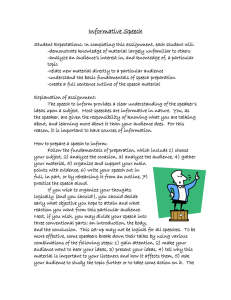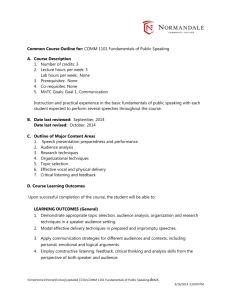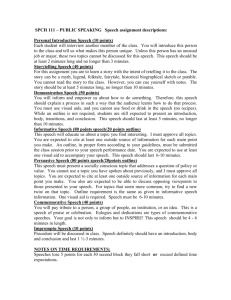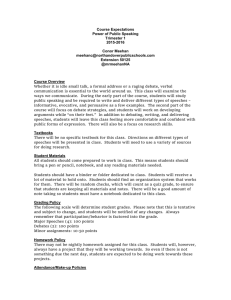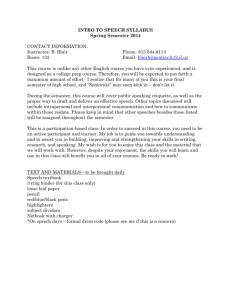Fundamentals of Speech - Eagle
advertisement
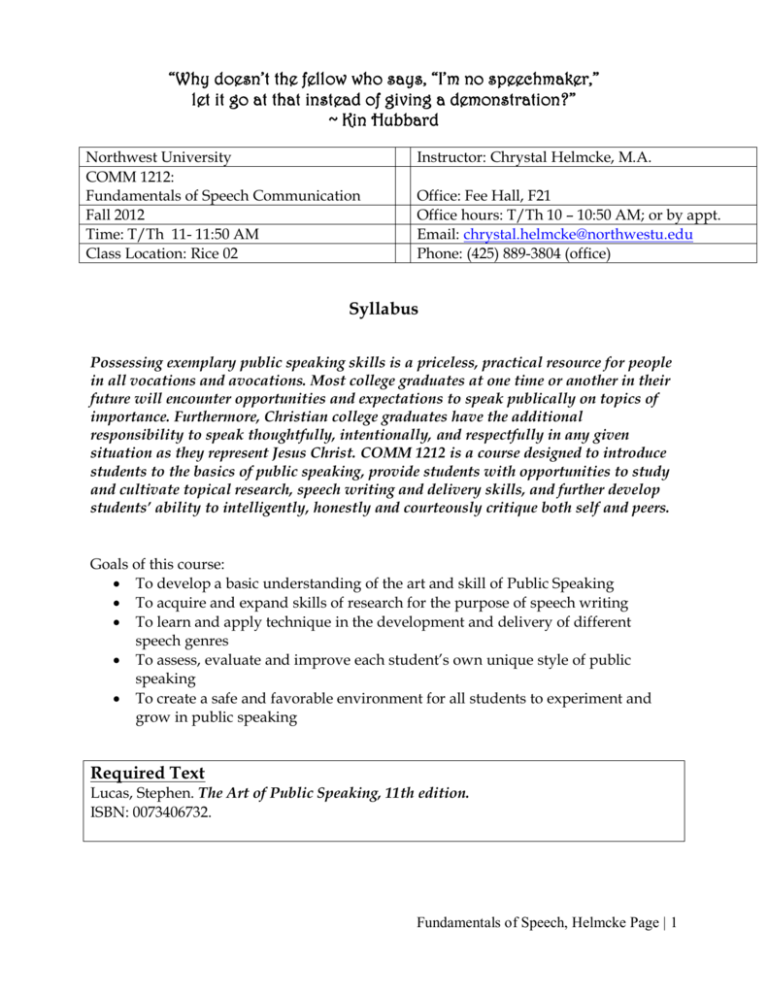
“Why doesn’t the fellow who says, “I’m no speechmaker,” let it go at that instead of giving a demonstration?” ~ Kin Hubbard Northwest University COMM 1212: Fundamentals of Speech Communication Fall 2012 Time: T/Th 11- 11:50 AM Class Location: Rice 02 Instructor: Chrystal Helmcke, M.A. Office: Fee Hall, F21 Office hours: T/Th 10 – 10:50 AM; or by appt. Email: chrystal.helmcke@northwestu.edu Phone: (425) 889-3804 (office) Syllabus Possessing exemplary public speaking skills is a priceless, practical resource for people in all vocations and avocations. Most college graduates at one time or another in their future will encounter opportunities and expectations to speak publically on topics of importance. Furthermore, Christian college graduates have the additional responsibility to speak thoughtfully, intentionally, and respectfully in any given situation as they represent Jesus Christ. COMM 1212 is a course designed to introduce students to the basics of public speaking, provide students with opportunities to study and cultivate topical research, speech writing and delivery skills, and further develop students’ ability to intelligently, honestly and courteously critique both self and peers. Goals of this course: To develop a basic understanding of the art and skill of Public Speaking To acquire and expand skills of research for the purpose of speech writing To learn and apply technique in the development and delivery of different speech genres To assess, evaluate and improve each student’s own unique style of public speaking To create a safe and favorable environment for all students to experiment and grow in public speaking Required Text Lucas, Stephen. The Art of Public Speaking, 11th edition. ISBN: 0073406732. Fundamentals of Speech, Helmcke Page | 1 Classroom Expectations and Attendance Public Speaking is an endeavor that requires skill in research, organizational thought, voice production, poise and presence. In addition to learning and practicing these skills in class, students should expect to spend a minimum of 2-3 hours each week in research, preparation and rehearsal time outside of class. Furthermore, this class is by design a participation class. Each student’s active, intelligent and bold participation in class activities, as well as his or her participation in peer critique is essential to personal and academic success. Regular, consistent attendance is vital to a student’s achievement of minimum proficiency in Fundamentals of Speech. Attendance is graded by 1) physical presence, 2) punctuality, and 3) observable preparation for and engagement in class discussion and activities. Our individual and collective time is valuable. Please demonstrate your respect for it by arriving on time and well-prepared, intelligently engaging with the instructor and your peers, remaining in class for the entire period, and repeating this pattern throughout the semester. If you miss a lecture, it is YOUR responsibility to get notes from a classmate. Please note: any unexcused absence on a performance day will result in the lowering of your final grade by one FULL letter, and missing MORE than 6 class periods will result in an automatic failing final grade. On regular class days, please wear comfortable clothes which provide comfort and flexibility of movement. NO flip-flops. On performance days, please wear comfortable, yet professional attire. Your clothing has the ability to inhibit or enhance your performance and always makes a statement about you. A presentation schedule will be generated for each genre of speech. If you are unable to present on your scheduled day, it is your responsibility to 1) reschedule with another classmate, and 2) inform the instructor of the change in advance of class start time. Please email Chrystal Helmcke at chrystal.helmcke@northwestu.edu a minimum of 30 minutes prior to 11 AM. Textbook readings as identified for each class session should be completed before class begins. You are encouraged to take notes on the readings and bring the notes to class. You will be allowed one 3x5 note card with hand-written notes for reading quizzes. Bring your textbook to class EVERY DAY – you are expected to have the textbook out and immediately accessible for reference during class discussion and activities. Index Cards (4x6 inches) - You will need to provide several index cards for yourself for each speech. You are encouraged to purchase a pack with a partner. Fundamentals of Speech, Helmcke Page | 2 Classroom Expectations and Attendance, continued… All written assignments are due before or at the beginning of class. Late work will be accepted only 48 hours after the original due date and time. Additionally, late work will be valued for only 50% of the original point total. After 48 hours late work will not be accepted and a “0” will be entered as the grade for the assignment. In the event of a SERIOUS and WRITTEN DOCUMENTED illness or family emergency, exceptions may be made, and will be assessed on a case-bycase basis. If such a situation arises, you MUST make a face-to-face appointment with me to discuss consequences and/or possible make-up work or extra credit. Every written assignment turned in must include the following information on the title page: o “Student’s Name” o Professor Chrystal Helmcke o COMM 1212 o “Due Date” Electronic Device Policy: Use of all electronic devices (ex. mobile phones, tablet computers, and laptops, etc.) will be restricted to specialized class activities on particular days. At these prearranged times, express permission will be given for the use of electronic devices. Whenever possible, students will be given advance notice for when electronic devices will be allowed. At all other times and during ALL student speeches all electronic devices are to be closed/off/”silent” and most especially, out-of-sight. No exceptions! Communicating with the Instructor: My preferred mode of communication is via email. I make every effort to respond promptly to questions and concerns respectfully addressed in emails sent to my NU address (chrystal.helmcke@northwestu.edu) during normal work hours (generally 9 AM – 5:30 PM). However, there are situations where email is inadequate for satisfactory communication – such as emergencies, complex questions or concerns, or personal and sensitive issues. In such cases, a phone or face-to-face conversation may be a better choice. I have office hours (noted in the heading of the syllabus) and usually will be available before or after class for brief consultation. In addition, I do not work on Friday because it is my Sabbath day. Therefore, I do not read or respond to emails nor do I listen or respond to voice mail. I will check emails and voice mail on Saturdays. Always do your own work! Plagiarism is illegal and unacceptable. Plagiarism is taking credit for someone else’s work. The consequences are severe and may include failing an assignment, failing the course and even immediate dismissal from the University. Please refer to NU’s online Academic Catalogue in the section on Academic Honesty under Academic Policies for a full definition of what constitutes plagiarism and NU’s academic expectations and disciplinary procedure. Fundamentals of Speech, Helmcke Page | 3 Assignments Reading Our primary reading source is Stephen Lucas’ text, The Art of Public Speaking (11th edition). Reading assignments from this text are arranged and listed in the attached weekly schedule. Students are expected to have completed each reading assignment before class begins. Students are strongly encouraged to take notes and/or highlight key information in your text. Occasionally other reading may be assigned and the materials will be made available to you electronically (usually via Discovery) or on reserve in the campus library. Reading Quizzes Unannounced quizzes will be given periodically to encourage students to stay current with the reading assignments. These quizzes will be given during the first 10 minutes of any given class period. Students will be allowed one 3x5 note card with hand-written notes for reading quizzes. If a quiz is missed because of tardiness or an unexcused absence, it CANNOT be made up. Speeches Students will select and research topics for four (4) speeches which will be given in and for this class. Each speech will require outside class preparation and rehearsal time. Although each speech is worth the same amount of points, the expectations of preparation, delivery and content quality, and creativity will increase with each subsequent speech. In other words, a progressively higher quality of work will be expected with each successive performance. A performance rubric will be posted on Discovery within the first three weeks of class. The speech genres are as follows: Introductory or “All About Me” (2-3 minutes) Informative or Demonstrative (5-7 minutes) Persuasive (5-7 minutes) Commemorative (8-10) minutes) A complete description of each speech genre will be made available on the class Discovery page. Speech Outlines For each speech presented students will first write a content outline. Outlines should include specific details about the introduction, the body of main points and the conclusion of each speech. Each outline must also include a bibliography or Works Cited page using MLA or APA format. This assignment is one important key to developing and delivering a strong speech – it is worth your time! Each outline will be reviewed for content or structural concerns. Although these outlines will not be graded by specific criteria, they are worth 25 points each if complete and turned in on time. Fundamentals of Speech, Helmcke Page | 4 Peer Evaluations Each student will complete a minimum of four (4) peer evaluations on every speech performance day. Students will be assigned to critique specific peers and will be given a critique template to use as a guide. As with the Speech Outline Assignment, these peer reviews will not be graded for specific content. However, each set of Peer Evaluations, if written thoughtfully and turned in on time will be worth 20 points. Self Evaluations Each student will complete a critique of his/her own performance for every speech assignment. Students will be provided a self-evaluation template to use as a guide. Self Evaluations will be graded on their thoughtful and attentive insights on each speech. Especially well-written Self Evaluations will consider and apply information from recent textbook readings, class discussions and class activities. Final Exam There will be a comprehensive final exam given during the class exam period on December 11, 2012. The exam will cover all textbook readings, additional information given during lectures and speech evaluation discussions, additional reading material, and any and all video or audio materials presented in class or assigned as homework. The exam will consist of multiple choice and short answer questions. Fundamentals of Speech, Helmcke Page | 5 Grading Please understand, I do not give you a grade. You earn your grade. Your final grade will be determined as follows: Attendance and Participation 400 points Every student begins with a full 400 points. Deductions are as follows: -30 unexcused absence -10 lack of preparation or 5+ minutes tardy for any class session Reading Quizzes Speech Outlines Speeches Peer Evaluations Self Evaluation Final Exam 200 points (5 x 40 points each) 100 points (4 x 25 points each) 400 points (4 x 100 points each) 400 points (100 points for each set per speech genre) 200 points (4 x 50 points each) 300 points TOTAL 2000 points Letter equivalents are determined by the following percentage system: 1800 - 2000 points = +90% 1600 - 1799 points = +80% 1400 - 1599 points = +70% 1320 to 1399 points = +66% 1319 and below =A =B =C =D = Fail EXTRA CREDIT Throughout the semester, there may be opportunities for extra credit. If such opportunities are offered and you undertake them successfully, you may earn up to a maximum of 50 points extra credit. Please note: Extra Credit opportunities are available only to students who demonstrate 1) consistent attendance, 2) prompt turn-in of complete assignments, and 3) active engagement in class discussion and activities. Extra Credit is NOT offered as a replacement for expected work assigned in the syllabus. Fundamentals of Speech, Helmcke Page | 6 Weekly Class Schedule DATE 8/28 8/30 9/4 CLASS FOCUS Introductions Syllabus and course overview What is Public Speaking, really? The Fundamentals Ethics and Public Speaking Homework/Reading Due Lucas Chpt. 1 Lucas Chpt.2 Due: Introductory Speech Outline 9/6 9/11 9/13 9/18 9/20 9/25 9/27 10/2 Listening to and Evaluating Speeches Introductory Speeches Introductory Speeches Introductory Speeches Choosing Topics and Purposes Speaking to Inform Organizing and Outlining the Speech Analyzing the Audience Lucas Chpt. 3 Lucas Chpts. 4 Lucas Chpt. 14 Lucas Chpt. 8, 9 and 10 Lucas Chpt. 5 DUE: Inform/Demo Speech Outline 10/4 10/9 10/11 10/16 10/18 10/23 10/25 Delivering the Speech and Using Visual Aids Informative/Demonstrative Speeches Informative/Demonstrative Speeches Informative/Demonstrative Speeches Informative/Demonstrative Speeches Introducing Persuasive Speaking and Methods of Persuasion Gathering and Using Supporting Materials Lucas Chpt. 12-13 Lucas Chpt. 15 and 16 Lucas Chpt. 6 and 7 DUE: Persuasive Speech Outline 10/30 11/1 11/1, 2, 3, & 8, 9, 10 Persuasive Speeches Persuasive Speeches NU’s Production of The Learned Ladies of Park Avenue 11/15 Persuasive Speeches Persuasive Speeches Commemorative Speaking and Using Language Effectively Individual Meetings 11/20 11/22 Commemorative Speeches NO Class – Thanksgiving Holiday 11/6 11/8 11/13 Lucas Chpt. 17 and 11 DUE: Commemorative Speech Outline Fundamentals of Speech, Helmcke Page | 7 11/27 11/29 12/4 12/6 12/11 Commemorative Speeches Commemorative Speeches Commemorative Speeches Commemorative Speeches Final Exam Fundamentals of Speech, Helmcke Page | 8

